Great Wall Trekking
for 9 Days Including Camping

|
|
TOUR PRICE
(each person)
# of Head |
USD |
1 |
3659 |
2-3 |
2089 |
4-5 |
1659 |
6-9 |
1549 |
10+ |
1409 |
WHAT'S INCLUDED IN PRICE
* Free personal transfers from and to
hotel/airport/train station and drop-offs
* Entry fees to the Great Wall sections
* Daily meals (when hiking on the Great Wall)
* The privilege of camping on the Great Wall and exclusive access to
the camping watch tower
* All other accommodation along the Great Wall
* All necessary camping gears such as tents & bags
* Quality vehicle, professional driver and English-speaking tour
guide
* Free membership card
* A credit of RMB100 toward your next China national tour with us.
There are no unscheduled or
mandatory shopping stops.
Climbing Pole Rental:
$6/each/day; $10/pair/day.

Complimentary Airport Pickup
|
|
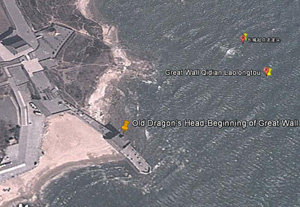
Old Dragon's Head (Laolongtou), the beginning
of the Great Wall on Google Earth
|
|
TRAVEL INSURANCE
If you currently don’t have travel insurance then
you will be required to purchase our PICC (People's Insurance
Company of China) travel and accidental insurance.
The fee will be $49.95 per person, and will cover the duration of
your hiking/camping/trekking in order to ensure that you are
comprehensively protected if injured.
For more information about our travel insurance policy please
see our insurance page.
QUALITY VEHICLES


|
|
|
TOUR 9A: Great Wall Trekking & Hiking for 9 Days
Not to miss any important sections of the
Great Wall from the ocean to Beijing
This program has been crafted for serious Great Wall enthusiasts. In
addition to being a test of strength and endurance, this tour shows you
the best sections of the Great Wall in northeast China.

9-day Highlights:
 For Great Wall
enthusiasts, this is the ultimate experience. This 9-day tour takes you
to every popular Great Wall hike in northeast China. You’ll see every
example of Great Wall architecture and structure on this trek. For Great Wall
enthusiasts, this is the ultimate experience. This 9-day tour takes you
to every popular Great Wall hike in northeast China. You’ll see every
example of Great Wall architecture and structure on this trek.
 You’ll have the option of
sleeping overnight in one of the watchtowers of the Great Wall, which is
sure to be an unforgettable experience! Watch the sunrise and sunset
from the best seat in the house! You’ll have the option of
sleeping overnight in one of the watchtowers of the Great Wall, which is
sure to be an unforgettable experience! Watch the sunrise and sunset
from the best seat in the house!
 Your private guide will
be with you every step of the way, ensuring that your tour is both safe
and informative. Your private guide will
be with you every step of the way, ensuring that your tour is both safe
and informative.
 Visit the Qing Tombs, the
resting place of China’s last ruling dynasty. Visit the Qing Tombs, the
resting place of China’s last ruling dynasty.
 Our program we’ll also
include a trek from Jiankou to Mutianyu, which features restored and
natural Great Wall as well as a toboggan ride! Our program we’ll also
include a trek from Jiankou to Mutianyu, which features restored and
natural Great Wall as well as a toboggan ride!
Departure:
Our Great Wall hiking is a
private service. What this means is that you can hike on the Great Wall
at any time at your convenience. If you would much
rather be part of a group for the experience
for economic and social reasons,
we'll check to see if there are more signups for the same date as your
own. We'll keep you updated whenever there are more. If you would like
to keep your tour a private one, please let us know and we'll assign you
a guide and driver.
TRIP MAP
 See this thrilling route on
the
map.
See this thrilling route on
the
map.
Day-by-day Itinerary
DAY 1 | DAY
2 | DAY 3 | DAY 4 |
DAY 5 | DAY 6 | DAY 7 |
DAY 8 |
DAY 9
Day 1: Beijing - Old
Dragon’s Head - Shanhaiguan (L+D, 4 hours)
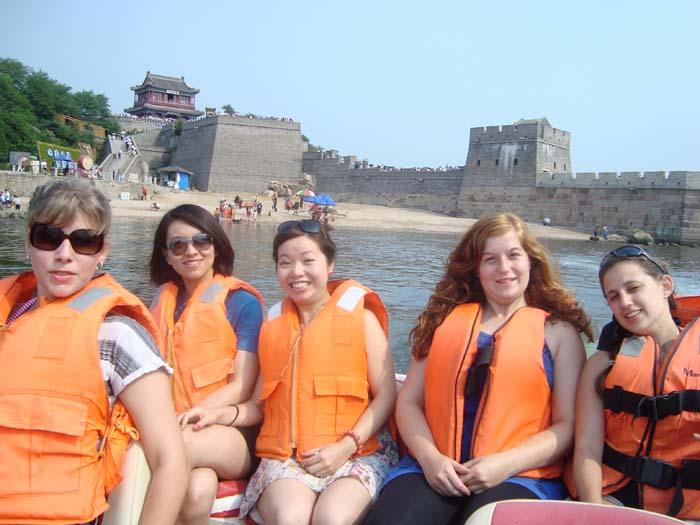
We will meet you in the morning at
7:30 a.m. You’ll enjoy a combination of a Western and Chinese
breakfast on the first floor restaurant of your hotel. From
there we will make the 4.5-hour drive to the
Shanhaiguan Pass,
which is in a town situated in the northeast of Qinhuangdao
City, Hebei Province. It adjoins the Bohai Sea to the southeast
and the Yanshan Mountain to the northwest.
After lunch at a local Chinese
restaurant, we’ll have a tour to the
Great Wall Museum to learn
about the history of the Great Wall. You’ll also learn about the
history and military strategy of this section of wall, as well
as see military relics. We will start our hike at Old Dragon’s
Head, also known as Laolongtou. Laolongtou is the most eastern
section of the Great Wall, which extends into the Bohai Sea.
Standing here is almost like being on a peninsula as you can
feel the overwhelming power of the rolling sea. This hike takes
about 40 minutes.
After marveling at the scenery here,
we will make our way to the Shanhaiguan Pass Fortress, which is
also known as “The First Pass Under Heaven”. Climbing up the
Zhendong Tower, you will see that to one side of the tower is
the rolling sea, while on the other lies the impressive Great
Wall.
For the night we will stay at the
First Pass Hotel in Shanhaiguan Pass (a simple but clean hotel
with private washroom and hot water shower), and have a tasty
dinner of Northern Chinese cuisine to get you started for
tomorrow’s hike. Be sure to wear a long sleeve shirt, as we will
be walking through lots of bushes tomorrow.
[TOP]
|
|
Day 2: Jiaoshan –
Sandaoguan - Dongjiakou (B+L+D, 12 kms/7.5 miles, 5 hours)
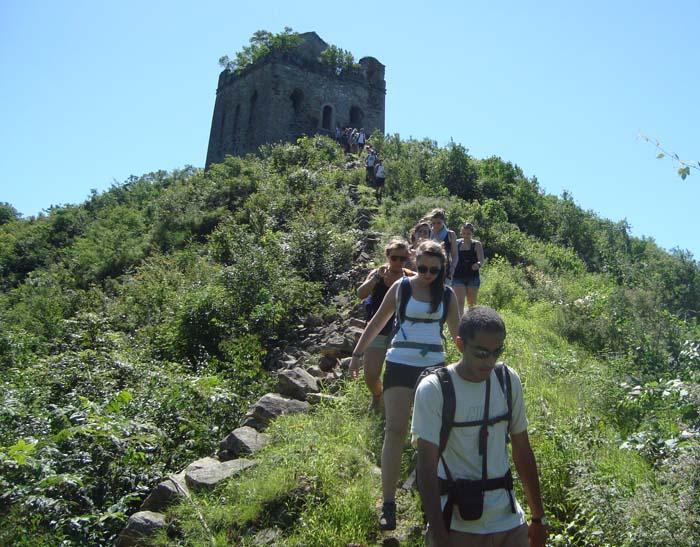
After waking up and having breakfast,
we will pick up where we left of yesterday, beginning at the
Jiaoshan Great Wall we’ll head towards Sandaoguan. The Jiaoshan
ancient wall provides you a sense of historical vicissitude.
Walking on the dilapidated wall is a great challenge. The wall
appears more and more crumbled and deformed as you forge ahead.
In some sections, the wall is only built on one side, with the
other side being the deep cliffs. In some sections, the mountain
ridge is functioned as the wall, which is called by experts
"mountain-supported wall". Watch your steps when you enter this
zone. After a one-hour's difficult climb, you will arrive at
Dapingding Peak, the main peak of Jiaoshan Mountain. You will
get a panoramic view of the Changshou (Longevity) Mountain
Scenic Area.
Jiaoshan Ancient Wall turns east from
Dapingding Peak. It first noses down the eastern slope of
Dapingding Peak, climbs over Liumianding Mountain and then
arrives at Sandaoguan Pass, which is actually a twin watchtower.
The travel from Dapingding Peak to Sandaoguan Pass takes about
one hour, and also, it is a thorny track which is difficult to
reach. You will have entered Changshou Mountain Scenic Area from
Jiaoshan Great Wall at the end of this trekking.
It is no exaggeration to say Sandaoguan Great Wall is one of the most wondrous segments of
the Great Wall. Amazingly, some segments of the wall here were
builton cliffs at a 90-degree incline. It appropriately earned
the nickname "The Wall Hanging Upside Down”.
After exploring Sandaoguan we will
drive about one and a half hours to the village of Dongjiakou,
where we will stay in the local farmer's home. It’s very simple
but clean (two-bed, with no private washroom and hot water for
shower).
|
|
Day 3: Eastern Qing
Tomb-Huangyaguan Section Great Wall (B+L+D, 6 kms/3.5 miles, 3
hours)
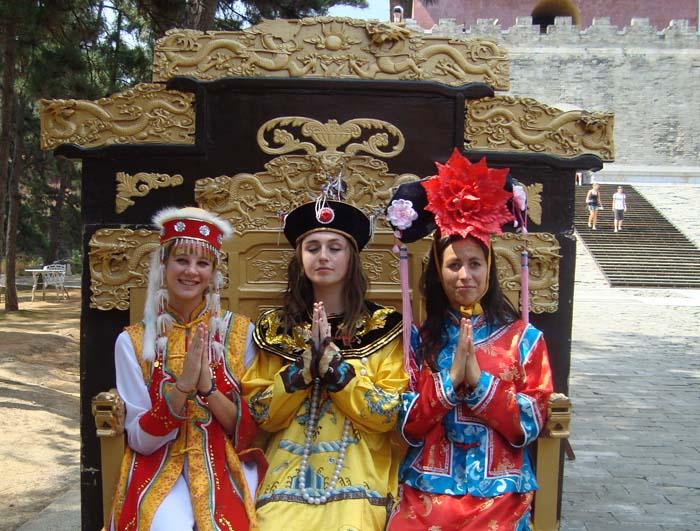
Following breakfast in the morning we
will make the drive to the East Qing Tombs. The Eastern Qing
Tombs, which is among the finest, best-preserved and largest of
the extant tomb complexes in China. Along the south side of Changrui Mountain, the tombs of five emperors, four empresses,
five imperial concubines, and one princess are arrayed based on
the traditional concept of placing the most senior and most
distinguished in the center.
Of all the tombs, Xiaoling is the
biggest and most elaborate, standing as the focal point of the
entire structure. The grandeur of this tomb may be attributed to
its having been the first sepulcher constructed for a member of
the royal family of the Qing Dynasty, so the builders hoped to
set the tone for a prosperous future. Crossing through the Great
Red Gate, you can see buildings of different sizes, all with
roofs of yellow glazed tile, connected by the brick paths or
'sacred ways' that converge in the area of Xiaoling.
An example of the most exquisite
architecture of the Eastern Qing Tombs is Dingdongling, the tomb
of Empress Dowager Cixi. Although she handled affairs of state
for more than 45 years, she never ascended the throne. (The only
female ruler in Chinese history was Empress Wu Zetian in the
Tang Dynasty (618-907). Elaborate and highly refined decorations
and carvings inside Dingdongling make it unique among the tombs
of the Qing Dynasty.
Shortly after lunch we will drive to
a small village, where we will start our afternoon hike on the
Great Wall on Huangyaguan. It is designed as a miniature of the
entire Great Wall of China, thereby allowing you get an
understanding of the entire wall in a fraction of the time. The
entire section is built on an abrupt mountain ridge. After about
an hour’s walk we will reach a peak overlooking the valley
below. Form the peak we can also see the Huangyaguan Fortress,
which was restored in 1984. From this vantage point, we will be
able to see its Baguan pattern, a specially designed labyrinth
designed to confuse and entrap the enemy.
For that evening we will stay in a
hostel that is located at the foot of Huangyaguan (two-bed one
room with private washroom).
[TOP]
|
|
Day 4: Huangyaguan-Peace
Fortress –West Simatai Great Wall
(B+L+D, 10 kms/6.2 miles, 4 hours)
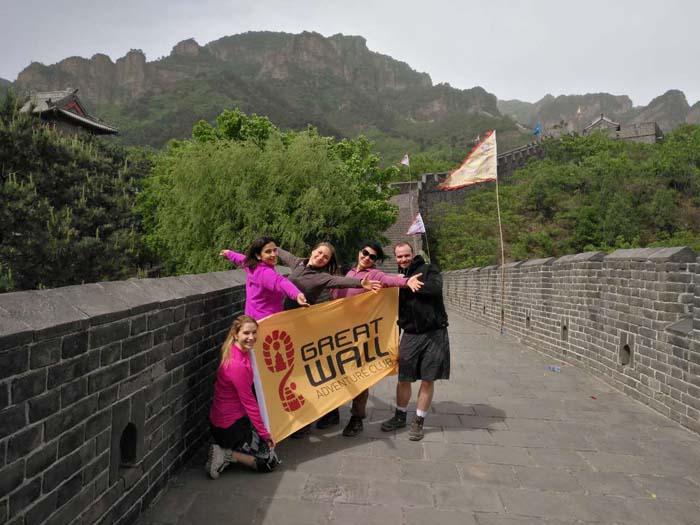
After waking up and having breakfast
we will resume our hike on the Huangyaguan
Great Wall. We’ll eventually drop down into the nearby valley
and clamber along the Wall as it gradually descends to the
valley below. With the hike of 2.5 hours, you will reach Peace
Fort the east gate of Huangyaguan.
Peace Fortress,
the other stronghold of Huangyaguan with an altitude of 500
meters, serves as the other end of Huangyaguan Great Wall. The
Fort is known about its various architectural style of
watchtowers called Duntai built with stones and wood. One of the
famous watchtowers called Guafulou was built by twelve widow
wives whose husbands died in the battles.
This part of the Great Wall was first
constructed in the Northern Qi Dynasty (550 – 577) and was
retained in 1466 supervised by General Qi Jiguang, the chief
commanding officer of Ji Garrison (one of the 11 garrisons in
the Ming Dynasty). There are six watch towers, one battlement,
one barbican, and one shortcut leading to the Great Wall.
In the afternoon, we’ll drive to the
West Simatai Great Wall, where we will overnight in one of our
partnership hostels at the foot of the Great
Wall.
|
|
Day 5: West Simatai-Jinshanling Section
Great Wall (B+L+D, 9 kms/5.5 miles, 3 hours)
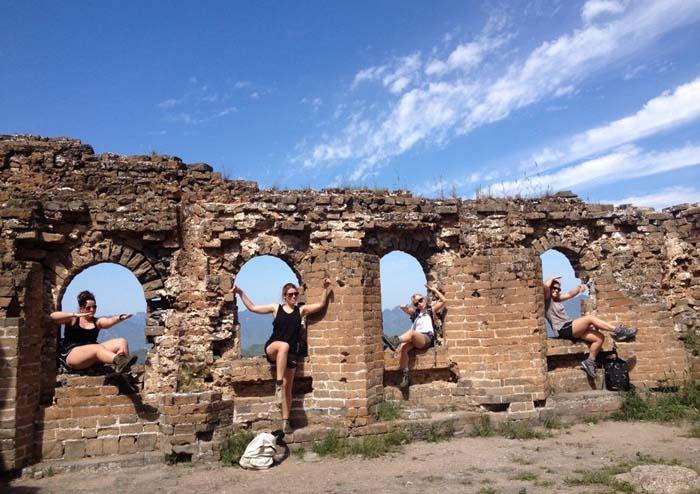
Following breakfast in the hotel
we’ll scale up the wall to begin our trek today at the West
Simatai Great Wall. Constructed under the supervision of Qi
Jiguang, a famous general in the Ming Dynasty (1368-1644), it is
the only part that still has the original appearance of the Ming
Dynasty. The wall is celebrated for its steepness, queerness and
intactness. The main tourist attractions include the Stairway to
Heaven, the Fairy Tower, the Heaven Bridge and the Wangjing
Tower. The Simatai section of the Great Wall is one of the few
sections to retain the original appearance of the Great Wall.
Incorporating a variety of characteristics of other sections of
the Great Wall, Simatai also displays some unique features of
its own.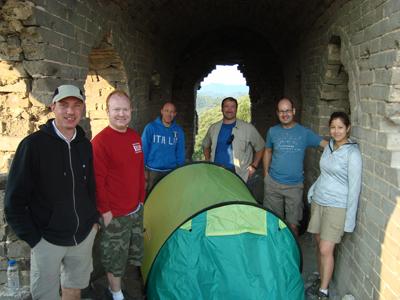
In the afternoon we will eventually
cross over into the Jinshanling Great Wall. The Great Wall at
Jinshanling is one of the best preserved parts of the Great Wall
with many original features. It got its name because it was
built on the Greater and Lesser Jinshan (‘Gold Mountain’)
Ranges. A tablet with the Chinese inscription for Jinshanling
Great Wall was set into this section. The Jinshanling Great Wall
has not been repaired since 1570. It is a remote and relatively
isolated section of the Great Wall.
As there are relatively few
tourists at Jinshanling Great Wall, it is a good place to
explore on foot. The Jinshanling Great Wall was initially built
from 1368 to 1389 in the Ming Dynasty (1368-1644), and in 1567
and 1570 rebuilding of the Wall was mainly directed by General
Qi Jiguang (1528-1588). Poems and tablet writings can be found
on the Jinshanling Great Wall left from the time when Qi Jiguang
directed the rebuilding of this section of the Great Wall. There
are more than 100 watch towers along the Jinshanling Great Wall.
‘Watching Beijing Tower’ is on the highest point, from which you
can see Beijing. The Jinshanling Great Wall is second only to
the Badaling Great Wall in its completeness.
After viewing the sunset over the
Great Wall, we’ll set up our camping facilities and sleep
in a watch tower tonight!
[TOP]
|
| Day 6: Jinshanling-Gubeikou
Section Great Wall (B+L+D, 12 kms/7.5 miles, 4.5 hours)
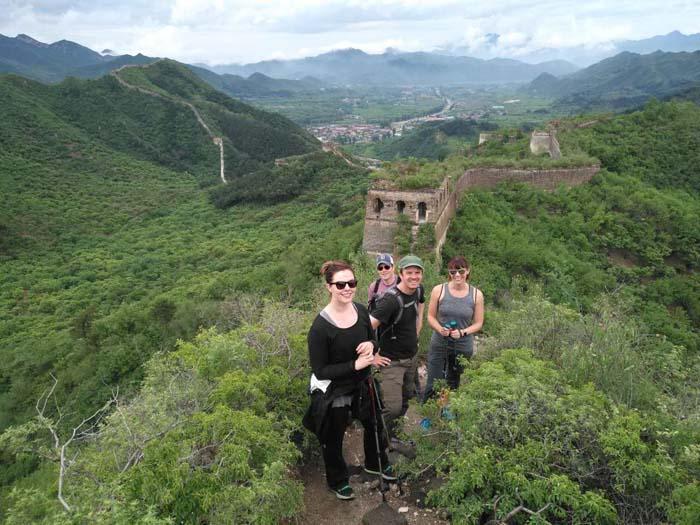
After waking up early to catch the
sunrise over the Great Wall, we’ll pack up our things and get
ready for our hike today. Today we’ll be continuing our hike on
the Jinshanling Great Wall. After about 1.5-2 hours of hiking we
will cross over into the Gubeikou Great Wall. The Gubeikou Great
Wall occupies a strategically important location, which is
difficult to access. Situated between Shanhaiguan Pass and
Juyongguan Pass, and about 62 miles to Beijing, it is the
bastion protecting the northern gateway to the capital. There
are 14 beacon towers, 143 watchtowers, 16 strategic pass, three
citadels and many other military constructions.
Gubeikou is completely unrestored,
covered with over 140 watchtowers, all differing in size and
design. From the wall here you will be able to witness how the
wall twists and winds along the steep mountain ranges. This is
as dramatic a view on the Great Wall as you’ll find. If the
weather is clear, you will be able to see the shimmering blue
lake of the Miyun Reservoir. There is a section on the wall that
is part of a military base, so you will be able to walk and
explore a quaint nearby local village while taking a detour and
re-enter the wall.
Following our hike at Gubeikou we’ll
drive to the Jiankou Great Wall, where we will spend the night
at an inn nearby.
[TOP]
|
Day 7: Jiankou
Adventure (B+L+D, 11 kms/7 miles, 4.5 hours)
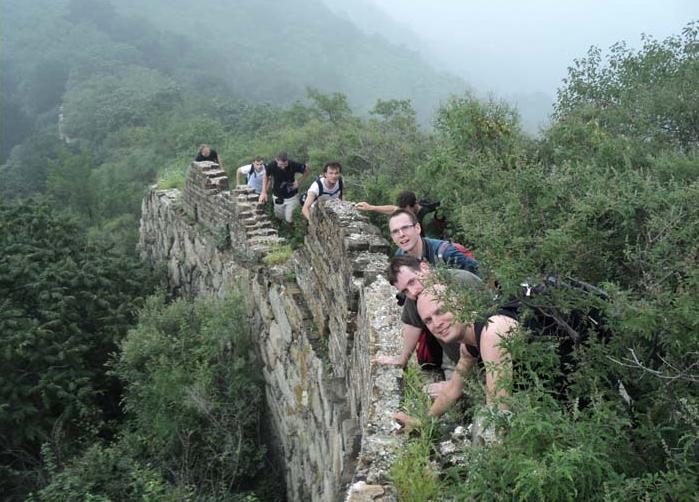
After waking up in the morning we will have
a Chinese-style breakfast first. In order to hike on Jiankou, first we have
to climb up a path for about 30-40 minutes (2km) to reach it.
Our hike today will take about 2.5 hours and will cover 4km.
Jiankou is translated as 'Arrow Nock' in English, for the shape
of the mountain is like an arrow, with the collapsed ridge
opening as its arrow nock. The Jiankou
section is known for its ruggedness and wild beauty, and you
will be in awe of the marvelous views it affords. As soon as we
reach Jiankou we will see a deserted watchtower that gives you a
panoramic view of the entire valley. In the early morning the
view is priceless with its morning fog. This section of the wall
is not well known by tourists, although if you see a picture of
the Great Wall from exotic traveling magazines, chances are it
is from Jiankou. This is the pinnacle of exotic Great Wall
scenery.
This part of the wall is often empty, so
you will have some peace and serenity on your hike today. Our
hike will begin in earnest from the watchtower known as
“Defending General”, and over the course of our trek we will
pass through seven to eight different watchtowers. Over the next
two hours we will be moving from west to east. As
we trek we’ll be able to see “Ying Feng Dao Yang” so named
because this watchtower was erected on the highest peak in the
area, and eagles and hawks often perch on it. Although the
majestic wall is slowly being conquered by small trees and
brambles, but the view from the top is still stunning! Other
landmarks will include the “Beijing Knot “ and the “Heavenly
Ladder”, but we will not be able to scale these peaks as they
are not accessible due to its toughness and dangerous footing.
The toughest challenge that this hike presents is a
portion known as the “38 Steps”, where the Wall vastly increases
in steepness, to the point that it is near 70 degrees! It is due
to this feature that we advise those with heart problems or a
phobia of heights not to go on this trip. The rest
of the hike is mostly smooth sailing.
We’ll end today’s hike at “Jiankou”, or
“Creek Pass” in English, which although pronounced the same as
the Great Wall section, has a different meaning in Chinese and
is composed of different characters. At “Jiankou” we’ll scale
down the wall, which, like the walk to get on, should take
roughly 30 minutes (2km). Once we descend from the Great Wall we
will spend the night at a farmer’s inn. The farmer’s family will
prepare for you a dinner of traditional Chinese dishes. Be sure
to get a good night’s sleep, for tomorrow we descend the wall
again at Zhengbeilou, where we will eventually cross over into
the Great Wall at Mutianyu.
[TOP]
|
|
Day 8: Jiankou-Mutianyu
(B+L+D, 10 kms/6.2 miles, 4 hours)
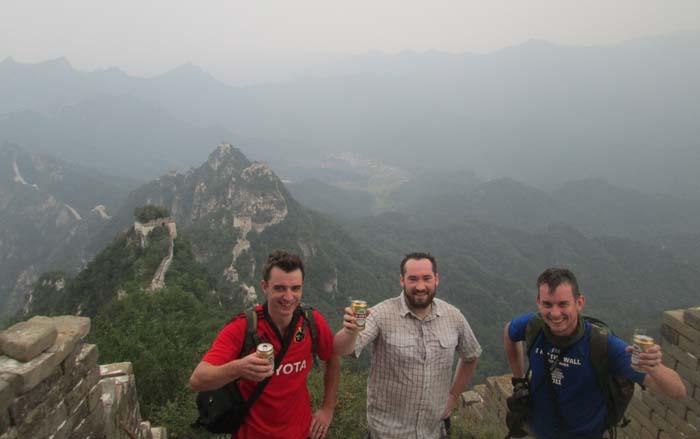
In order to hike on
Jiankou, first we
have to climb up a path for about 60 minutes to reach it.
Jiankou is translated as 'Arrow Nock' in English, for the shape
of the mountain is like an arrow, with the collapsed ridge
opening as its arrow nock. The Jiankou section is known
for its ruggedness and wild beauty, and you will be in awe of
the marvelous views it affords. As soon as we reach Jiankou we
will see a deserted watchtower that gives you a panoramic view
of the entire valley. In the early morning the view is priceless
with its morning fog. This section of the wall is not well known
by tourists, although if you see a picture of the Great Wall
from exotic traveling magazines, chances are it is from Jiankou.
This is the pinnacle of exotic Great Wall scenery.
This part of the wall is often empty,
so you will have some peace and serenity on your hike today.
From Jiankou we will cross over onto Mutianyu, a section of the
wall that has been largely restored. Although it has gotten a
face-lift, it avoids the army of tourists that plague Badaling.
Mutianyu offers some breathtaking views of the valley and wall
below, and if you look to your right you’ll see a large sign
engraved in the side of the mountain encouraging you to “Cherish
the teachings of Chairman Mao”. Mutianyu has also become popular
for visiting foreign leaders and celebrities (former U.S.
President Clinton visited Mutianyu on one of his trips to
China). After our visit to Mutianyu, we will drive back to the
inn at the slope of Jiankou, where we will spend the night
before embarking on more Jiankou hiking the next day.
|
| Day 9: Huanghuacheng-Xishuiyu-Beijing (B+L,
11 kms/7 miles, 4 hours)
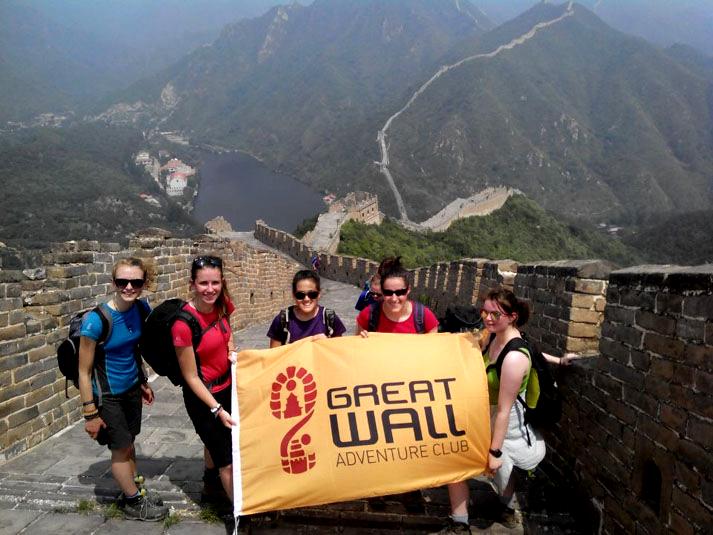
Following breakfast we will be driven
directly to Hunaghuacheng (or Huanghua Great Wall). After a
short walk around the dam on the Huanghuacheng Reservoir, we
will start our hike westward to Xishuiyu.
Going to the Huanghuacheng Great Wall, you have four things to do at least.
First, you should take photos. Since the lake breaks this
section of the Great Wall into three segments naturally, its
uniqueness might surprise you. And the Huanghuacheng Reservoir
lies here, shaped like a curved moon. Second, go to visit the
chestnut garden under the Great Wall, dating back to the Ming
Dynasty. The ancient chestnut trees still grow very well. Third,
climb up the steepest section of the Huanghuacheng Great Wall,
Shibadeng. It is like a dragon, ready to fly into the blue sky.
Fourth, look at Yaoziyu Castle. It was built in the Ming
Dynasty, still well preserved. In the castle, there is an
ancient Chinese scholar tree. It is said that touching it could
bring you a blessing.
The highest point of the wall is a
broken watchtower, and from there you will have a wide panoramic
view of the whole valley. From this summit the Wall dives
steeply downwards into the valley. The Gate is located at the
bottom, an opening in the wall, which connects the Zhuangdaokou
village on the inside, with the still-well-preserved Yaoziyu
Castle, built in the Ming Dynasty, on the outside. Over the top
of the passageway is another watchtower where we will rest a
short while before continuing on. On the inside of the gate you
will notice three large characters carved in the stone,
indicating the name of the village – ZhuangDaoKou. On the
outside is written the name of the passageway - “ZhenNu Pass” -
meaning “Defeat to Invaders”, a warning to potential attackers
in ancient times.
From here we will continue to trek
westward, climbing towards the broken wall to our destination, a
peak overlooking Xishuiyu Lake. From our vantage point, we will
see a real treat, the broken wall running underwater! From this
point, the wall is in too bad a condition to walk, so we will
follow a delightful mountain trail to Xishuiyu village, where we
will have a gourmet country-style Chinese lunch and have a
break. We’ll then drive back to Beijing, where you will be taken
back to your hotel, ending your nine-day Great Wall tour with
us.
[TOP]
|
|
|











